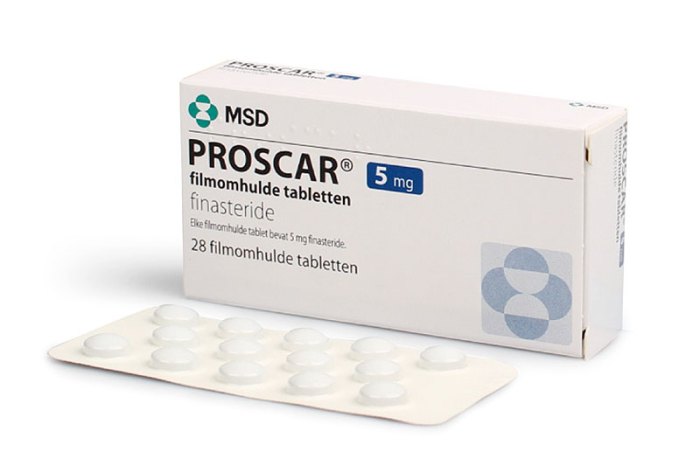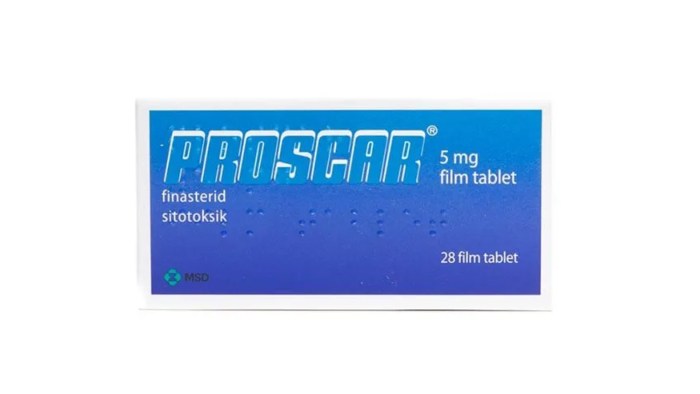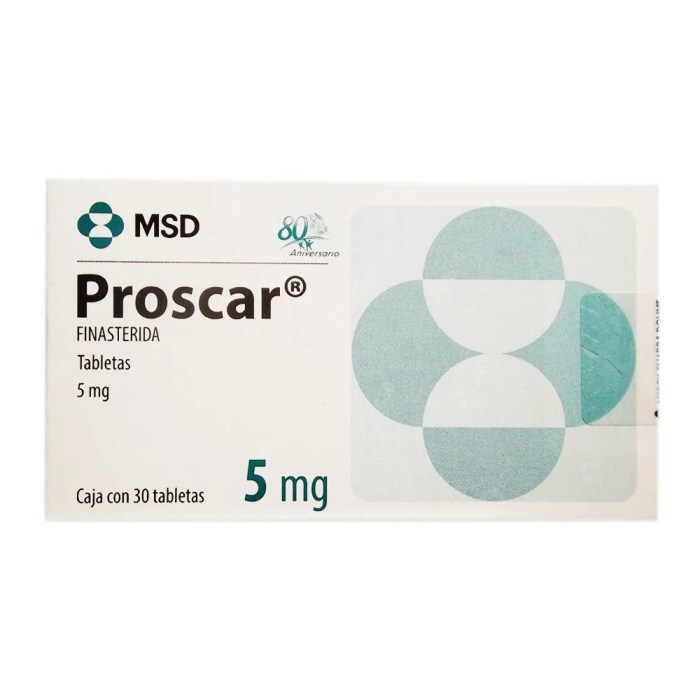Proscar, a medication commonly known as finasteride, takes center stage as we delve into its multifaceted role in healthcare. This drug has garnered significant attention for its ability to treat a variety of medical conditions, primarily those involving the male hormone, dihydrotestosterone (DHT). From its precise mechanism of action to its potential benefits and side effects, we aim to provide a comprehensive understanding of Proscar, empowering readers with valuable knowledge about this important medication.
Proscar’s impact extends beyond its initial use for benign prostatic hyperplasia (BPH), a condition affecting the prostate gland. It has also gained recognition for its potential in treating male pattern hair loss, a common concern for many men. This versatility, coupled with its unique pharmacological properties, makes Proscar a subject worthy of exploration and understanding.
Research and Studies

Proscar, the brand name for finasteride, has been extensively studied for its effectiveness and safety in treating benign prostatic hyperplasia (BPH) and male pattern hair loss (androgenetic alopecia). Numerous clinical trials and research studies have provided valuable insights into its mechanisms of action, efficacy, and potential side effects.
Clinical Trial Findings
Clinical trials have demonstrated the effectiveness of Proscar in treating BPH. Studies have shown that Proscar significantly reduces prostate size, improves urinary flow, and alleviates symptoms associated with BPH, such as frequent urination, difficulty starting urination, and weak urinary stream.
- A large-scale, long-term study called the “Proscar Long-Term Efficacy and Safety Study” followed over 3,000 men with BPH for up to 10 years. The study found that Proscar was effective in maintaining improvement in urinary symptoms and reducing the risk of acute urinary retention and the need for surgery.
- Another study, published in the journal “The Journal of Urology,” evaluated the effectiveness of Proscar in men with moderate to severe BPH. The study found that Proscar significantly improved urinary flow rates and reduced the severity of BPH symptoms.
Safety and Side Effects
Proscar is generally considered safe for most men when used as directed. However, like any medication, it can cause side effects. The most common side effects of Proscar include:
- Decreased libido
- Erectile dysfunction
- Ejaculatory disorders
- Breast tenderness or enlargement (gynecomastia)
It’s important to note that these side effects are usually mild and temporary. However, some men may experience more serious side effects, such as:
- Allergic reactions
- Liver problems
- Depression
Ongoing Research
Research on Proscar continues to explore its potential applications and address any concerns regarding its safety.
- One area of ongoing research focuses on the long-term effects of Proscar on prostate cancer risk. While some studies have suggested a possible link between Proscar use and a slightly increased risk of high-grade prostate cancer, other studies have not found this association. More research is needed to clarify this potential link.
- Researchers are also investigating the use of Proscar for other conditions, such as hair loss in women and prostate cancer prevention. However, further research is needed to determine the safety and efficacy of Proscar for these indications.
Proscar vs. Finasteride

Proscar and finasteride are both medications used to treat male pattern hair loss (androgenetic alopecia) and benign prostatic hyperplasia (BPH). They are essentially the same drug, but they differ in their dosage forms and intended uses.
Dosage Forms, Formulations, and Availability
Proscar and finasteride are available in different dosage forms, formulations, and availability:
- Proscar is available as a 5 mg tablet, specifically formulated for the treatment of BPH.
- Finasteride is available as a 1 mg tablet, specifically formulated for the treatment of male pattern hair loss.
- Finasteride is also available in a generic form, while Proscar is a brand-name drug.
Potential Differences in Effectiveness and Side Effects
While Proscar and finasteride are the same drug, their different dosages may lead to variations in effectiveness and side effects.
- Proscar, with its higher dosage, is generally more effective in treating BPH than finasteride.
- Finasteride, with its lower dosage, is generally considered safe and effective for treating male pattern hair loss.
- Side effects, such as sexual dysfunction, are generally considered more common with Proscar than with finasteride.
It is important to note that both Proscar and finasteride can cause side effects, and it is crucial to discuss any potential risks and benefits with a healthcare professional before starting either medication.
Patient Information and Resources: Proscar

This section provides essential information for patients considering or currently using Proscar, a medication for benign prostatic hyperplasia (BPH). We will also share reliable resources where patients can access further information and support, as well as offer advice on how to discuss Proscar with healthcare professionals.
Understanding Proscar
Proscar (finasteride) is a medication that works by reducing the production of a hormone called dihydrotestosterone (DHT) in the prostate gland. DHT is a potent androgen that contributes to prostate growth. By lowering DHT levels, Proscar helps shrink the prostate gland, relieving symptoms of BPH such as frequent urination, difficulty urinating, and urinary urgency.
Patient Information and Resources
Here are some important things to keep in mind if you are considering or currently using Proscar:
- Proscar is not a cure for BPH. It only helps manage symptoms and may not work for everyone.
- Proscar may take several weeks or months to work. It is important to continue taking it as prescribed even if you don’t notice immediate improvement.
- Proscar can cause side effects, including decreased libido, erectile dysfunction, and breast enlargement. These side effects are usually mild and temporary, but they can be serious in some cases.
- Proscar is not suitable for everyone. If you have a history of prostate cancer, liver disease, or other medical conditions, you may not be able to take Proscar.
- Proscar is not safe for women or children. If a woman is pregnant or may become pregnant, she should not handle Proscar tablets.
Reliable Resources
Here are some reliable resources where you can find more information about Proscar:
- Your doctor or pharmacist: They can provide you with personalized advice about Proscar and answer any questions you may have.
- The National Institutes of Health (NIH): The NIH website has a wealth of information about BPH, including treatment options like Proscar.
- The American Urological Association (AUA): The AUA website provides information about BPH, treatment options, and clinical trials.
- The Prostate Cancer Foundation (PCF): The PCF website offers information about prostate health, including BPH, and provides resources for patients and their families.
Discussing Proscar with Your Healthcare Professional
Here are some tips for discussing Proscar with your doctor or other healthcare professional:
- Be honest about your symptoms and medical history. This will help your doctor determine if Proscar is right for you.
- Ask questions about the risks and benefits of Proscar. It’s important to understand the potential side effects and how they might affect you.
- Discuss any concerns you have about taking Proscar. Your doctor can help address your concerns and provide you with reassurance.
- Don’t hesitate to ask for clarification if you don’t understand something. It’s important to be fully informed about your treatment options.
As we conclude our journey through the world of Proscar, it becomes clear that this medication holds significant promise for addressing a range of medical conditions. Its ability to effectively target DHT, a key hormone involved in prostate growth and hair loss, has paved the way for improved treatment options. However, it is crucial to remember that Proscar, like any medication, comes with potential side effects and interactions. Therefore, open communication with healthcare professionals remains paramount for informed decision-making and ensuring safe and effective treatment.
Proscar, also known as finasteride, is a medication primarily used to treat an enlarged prostate. It works by inhibiting the production of a hormone called dihydrotestosterone (DHT), which contributes to prostate growth. Interestingly, Proscar’s mechanism of action is similar to that of some immunosuppressant medications, which suppress the immune system by targeting specific cellular processes. While Proscar is not an immunosuppressant, the shared mechanism highlights the complexity of biological processes and the potential for repurposing medications for different therapeutic applications.